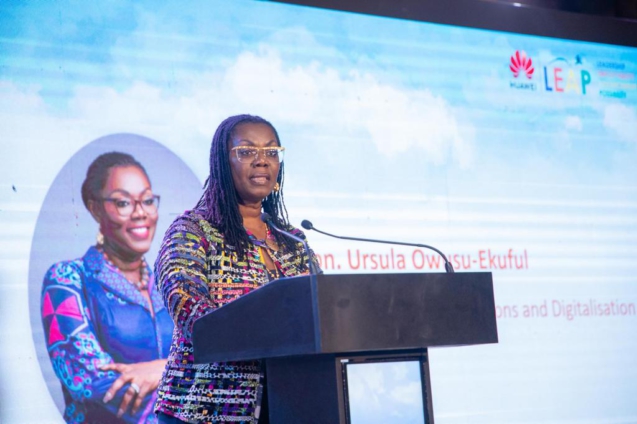The government of Ghana is currently working on to deploy ‘Big Data’ to rationalise the collection, processing, storing and sharing of data among government agencies.
This is expected to be the next major jump in the journey to completely digitise the Ghanaian economy.
According to Minister of Communications and Digitalisation, Ursula Owusu-Ekuful, ‘Big Data’ is expected to come with the needed data analytics platform which will help make proper sense of all the data being mined across government.
It will also help government track trends across the ecosystem, make projections based on data modelling techniques that will be critical for decision making across the spectrum.
Speaking at the World Development Report by the World Bank, Mrs. Ursula-Ekuful said ‘Big Data’ architecture also takes into consideration the data generated and stored within the private sector to ensure that there is seamless sharing of data across both private and public sectors.
She explained further that the ‘Big Data’ regime is expected to bring transparency and efficiency in the way data is utilized.
“The built-in artificial intelligence component will ensure real time update of the different models for different stakeholders. Government will then be able to make policy decision based on data science and communicate effectively to citizens who would have access to the same data. This should improve on the trust relationship between government and citizenry”.
“One of the most important outlooks of this initiative is the real and accurate information to the business community from the staples of government. The business community can make targeted investments in critical, high growth sectors of the economy where return on investment is high to enable economic growth”, she added.
Some identified sectorial models for the Big Data programme include Big Data for Healthcare, Big Data for Agriculture, and Big Data for Governance, Big Data for Trade and Bid Data for Security. Other are Big Data for Education, Big Data for Finance, big Data for Disaster Management and Big Data for recreation.
Sharing of real time information is also expected to improve security across the country as the security and intelligence agencies can target scarce resources to where it is needed most based on timely and accurate data.
Ursula Owusu-Ekuful said the partnership between development partners, civil societies and government is expected to improve as there will be more reliable and uniform data across all sectors of the economy readily available in the governance process.
On the commercial side, she pointed out government is looking to model a regulated commercial framework around big data.
This will encourage institutions, both private and public, to generate more data.
The Data Exchange Hub: will provide the infrastructure, protocols and framework for data sharing across public and private sectors. It will provide the needed APIs to integrate with critical government systems to provide data input in real time, the cost of data (hits) and the use of the data that is accessed will be managed through the data governance framework to minimise data abuse and privacy issues.
Data Governance Framework: The Big Data initiatives is expected to be deployed with a data governance framework which will define data value, data exchange protocols, security channels and protocols, data governance hierarchy, data exchange dispute resolution protocols, etc.
Rural Telephony Project for Connectivity: The underlying infrastructure to ensure that government get more value out of this data ecosystem it is building. GIFEC through the rural telephony project is extending connectivity to the most rural part of the communities with shared community base stations to allow all telco providers to be able to provide services to the rural folks without the CAPEX overhead on the part of the telco providers. This will facilitate access to the data ecosystem.
Ghana Card Integration for Identity of Persons and Corporates: The ongoing integration of the Ghana Card as the identity platform for persons across the ecosystem is part of the effort to sanitise, standardise and share data across the ecosystem. The Ghana Card is providing single identity services to persons whiles RGD is expected to provide single identity to institutions and companies across the ecosystem to build trust. This government believes will help in the standardisation of data across all platforms.
Latest Stories
-
Asantehene receives more 19th century gold ornament and regalia
5 mins -
Hohoe Ghana Blind Union organises training for members ahead of Election 2024
11 mins -
Alan Kyerematen reveals his future plans for Ghanaian Health professionals
12 mins -
AAIN empowers women and small enterprises in Upper East Region through SHINE project
13 mins -
Akufo-Addo leads nationwide commissioning of 80 educational projects
19 mins -
Ghana and Seychelles strengthen bilateral ties with focus on key sectors
50 mins -
National Elections Security Taskforce meets political party heads ahead of December elections
54 mins -
Samsung’s AI-powered innovations honored by Consumer Technology Association
1 hour -
Fugitive Zambian MP arrested in Zimbabwe – minister
2 hours -
Town council in Canada at standstill over refusal to take King’s oath
2 hours -
Trump picks Pam Bondi as attorney general after Matt Gaetz withdraws
2 hours -
Providing quality seeds to farmers is first step towards achieving food security in Ghana
2 hours -
Thousands of PayPal customers report brief outage
2 hours -
Gary Gensler to leave role as SEC chairman
2 hours -
Contraceptive pills recalled in South Africa after mix-up
3 hours

